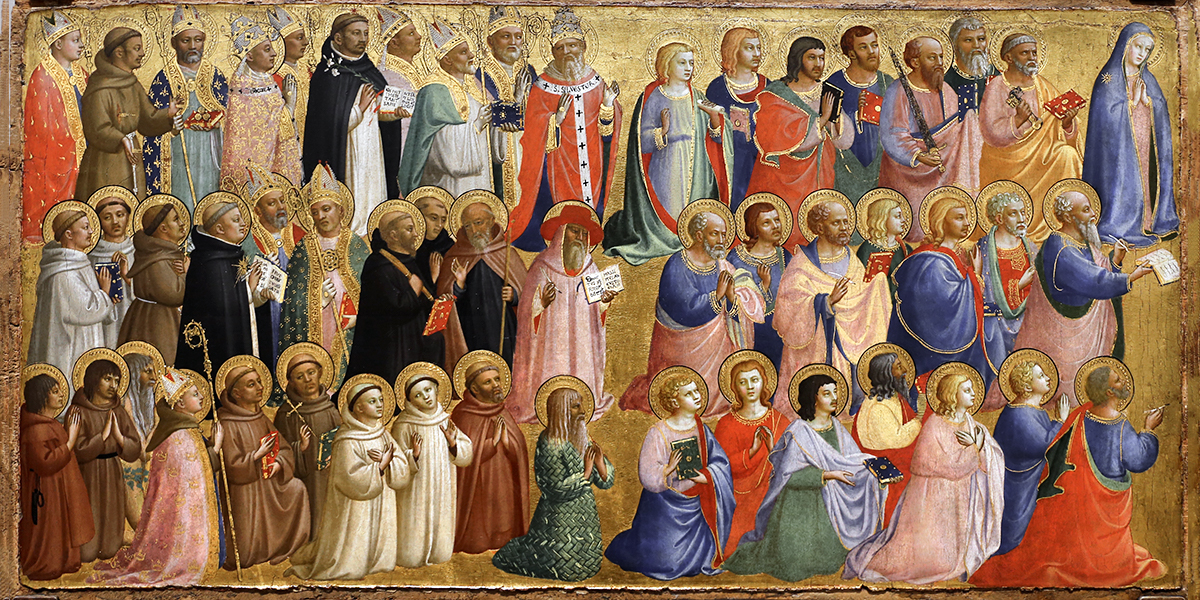
In a Gospel this past week Jesus referred to Jonah. Quite some time ago I gave talks for catechists based on Jonah. I’m resurrecting it here, not only for religion teachers but for anyone who might enjoy another look at this delightful short story. . . .
For too long the prophet Jonah has been overshadowed (or swallowed up?) by the great fish that swam into his life. Granted, this fish with the cast-iron stomach is an important supporting character in the tale. But when measured by instruments other than yardsticks, a man is bigger than a fish.
Anyone not distracted by the whale will realize that Jonah is a prime candidate for the role of patron of catechists. He is no superhero like Abraham, Moses, and David. He does not stride across the pages of the Bible in sandals too large for the average Christian to wear. He does not possess a secret weapon like Samson’s hair. Jonah does not have to raise twelve sons as Jacob did. Nor does he have to withstand a hundred and one forms of persecution as Jeremiah did. All in all, Jonah is an ordinary man living an ordinary prophet’s life.
Jonah, utterly and pitifully human in his faults and foibles, goes about his noble task of prophesying, showing fear, anger, obstinacy, and unpredictability. And yet, God uses him to accomplish the impossible. Because of Jonah’s flawed but successful service, he offers hope to every aspiring catechist who is less than perfect.
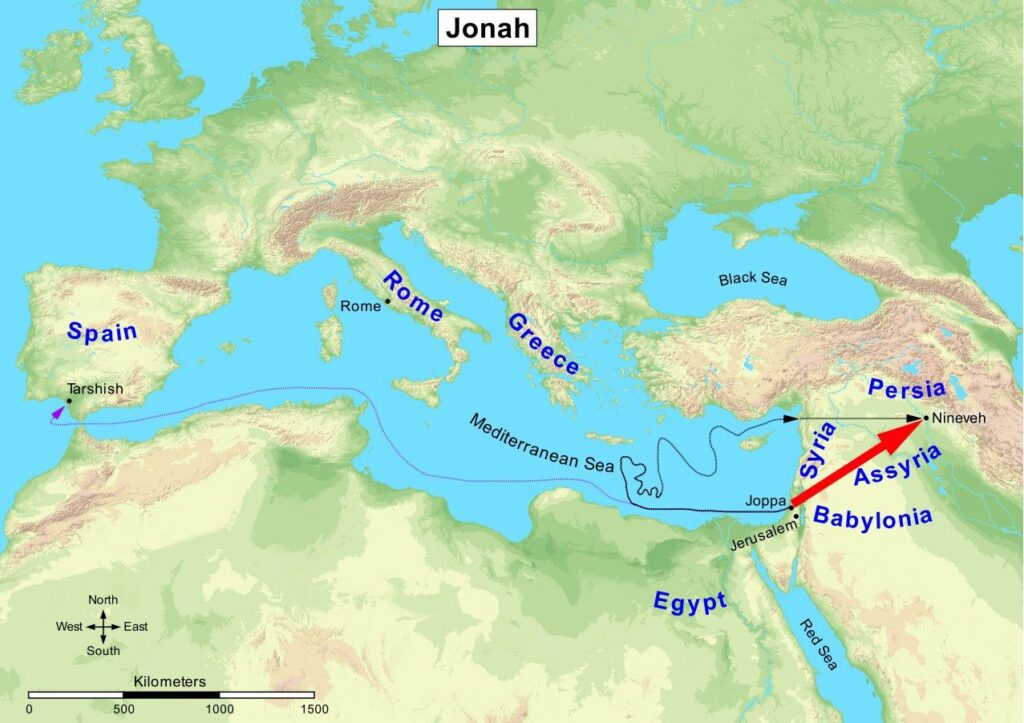
The story of Jonah opens with God’s commanding him to march into Nineveh, the capital of Israel’s dreaded enemy, Assyria. His mission: to preach against Nineveh and to predict that in forty days it would be wiped off the face of the earth—a job comparable to condemning communism is the streets of China. Any catechist assigned to spread the Good News to a class that has a reputation of being bad news should have no trouble identifying with Jonah.
Jonah does not go through the process of discernment or consult his spiritual director. He does the natural, cowardly thing. He runs away. Jonah is so terrified that simply refusing to cooperate is not enough. He boards a ship bound for the faraway city of Tarshish.
Jonah’s goodness, however, redeems him. First of all, as the Bible points out, he pays the fare on the escape ship. He is not a stowaway. Further, he honestly and humbly, if not prudently, admits to the crew that he is fleeing from his God.

All goes well for the runaway prophet until a raging storm attacks the ship. So violent is this specially brewed storm that the sailors toss the cargo overboard to lighten the ship. Somehow, in the midst of keeping the ship afloat, the crew finds time to cast lots to see who is to blame for the weather. Of course, the lots accuse Jonah. Unaware that the Lord is closing in on him, our hero lies fast asleep in the hold. quiet a feat considering the thunder, the waves, and his conscience, but characteristically human.
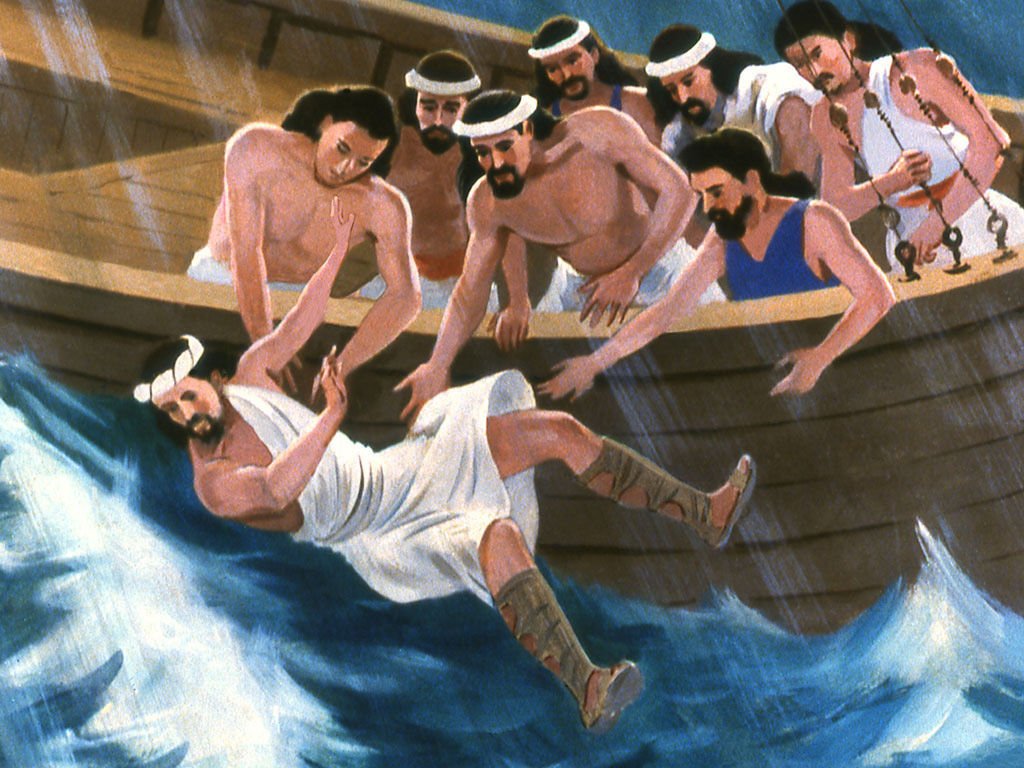
Once prodded awake and apprised of the situation, Jonah proves himself a really good Joe. He suggests that the sailors dump him overboard to save themselves and the ship. They take his advice and what follows is a conversion story worthy of the Guinness Book of Records. When the storm clears, all the sailors worship Jonah’s God, the God who made the sea and the land.
Leaving John in the sea for awhile, let us consider the manner of his shipboard witness. He does not preach a word to the sailors, but surrenders his life for their sakes. Through his self-sacrifice the tough pagan sailors come to a knowledge of God. Ironically, when Jonah is a coward, a jinx, and an outcast—most looks and feels like a total failure, he succeeds.
Now for the only “fish” part of the Jonah tale. While Jonah flounders in the swirling waters, seaweed clinging about his head, the Lord sends a large fish to catch him. Notice that the whale’s obedience to the Lord in the face of an unpleasant task exceeds that of Jonah. But who can surpass Jonah’s trust in the Lord when he prays a prayer of thanksgiving—not an act of contrition—from the belly of this fish. Again, Jonah shows himself the perfect model for catechists. Although in dire straits, half-drowned, and eaten by a sea monster (and what catechist has never been in a similar position?), Jonah is still full of living faith and praise for God. Living up to Jonah’s confidence in him, the Lord delivered Jonah, via whale express, from ship to shore. There Jonah is spewed out safe and sound, through probably a bit shaken and seasick.
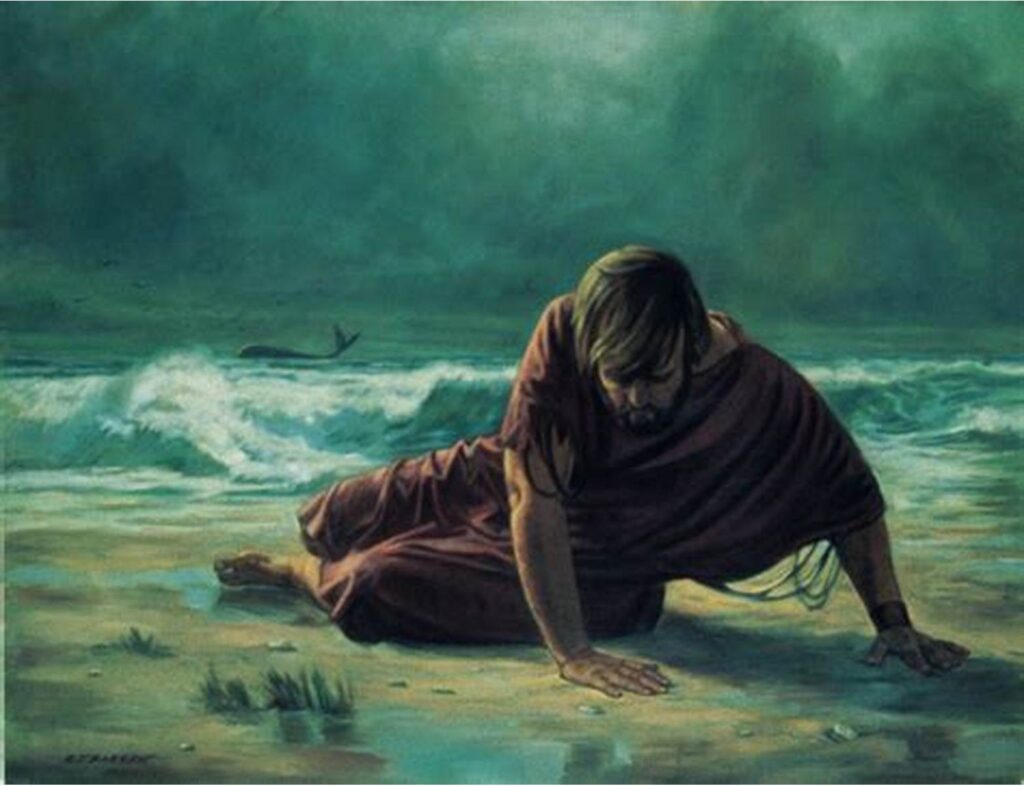
After his little game of hide-and-seek, Jonah is ready for Nineveh. His drenching has called him to his senses, and he realizes that the Lord’s will for him might well be the least of many possible evils.
Once in Nineveh, after only a single day of prophesying doom, Jonah surely merits the prophet-of-the-year award. For everyone in the city, including the king, fasts and sits in sackcloth and ashes. Even the sheep and cattle fast and wear sackcloth in sympathy with their masters, making the fields of Nineveh a sight to behold.
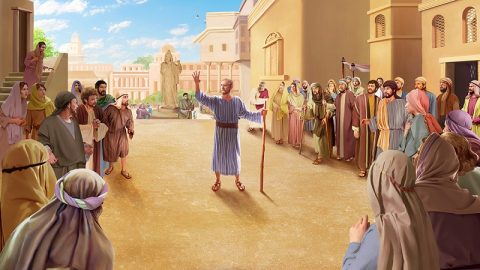
What was Jonah’s secret? He was not a profuse prophet or the book named for him would be longer than four chapters. Under the circumstances, he was not likely to be a dynamic speaker. According to the Bible , his words were not accompanied by spine-tingling miracles. And he certainly did not bombard the Ninevites through the media. Except in a passive way, the mass conversion of Nineveh was not Jonah’s doing at all. It was God’s When Jonah finally let God use him great things happened. He literally was an overnight success. God was able to work through Jonah to save an entire city. Jonah learns that being a witness if being a tool in God’s hands. God speaks and acts through people who turn over their lives to him.
The proper place for the story to end would be right here with God so moved by the people’s repentance that he decides to cancel their punishment and with Jonah covered in glory. But the foolish unpredictable side of Jonah’s human nature crops up and prolongs the tale.
Instead of being thrilled at Nineveh’s overwhelmingly positive response to his message, Jonah is angry that God changed his mind about destroying the city. He had been rather look forward to seeing a spectacular fire and brimstone demolition of his enemy. Therefore, Jonah breaks into a complaining speech in which he pretends that he fled before only because he knew that God was going to forgive the Ninevites. Strangely, in the course of his tantrum Jonah pays God a memorable compliment. He says, “I knew that you are a gracious and merciful God, slow to anger, rich in clemency loathe to punish.” Jonah concludes by declaring that he is so angry he wants to die. After his outburst, the disgruntled man parks himself on the outskirts of the town to see if God will comply with his wishes and consume Nineveh.
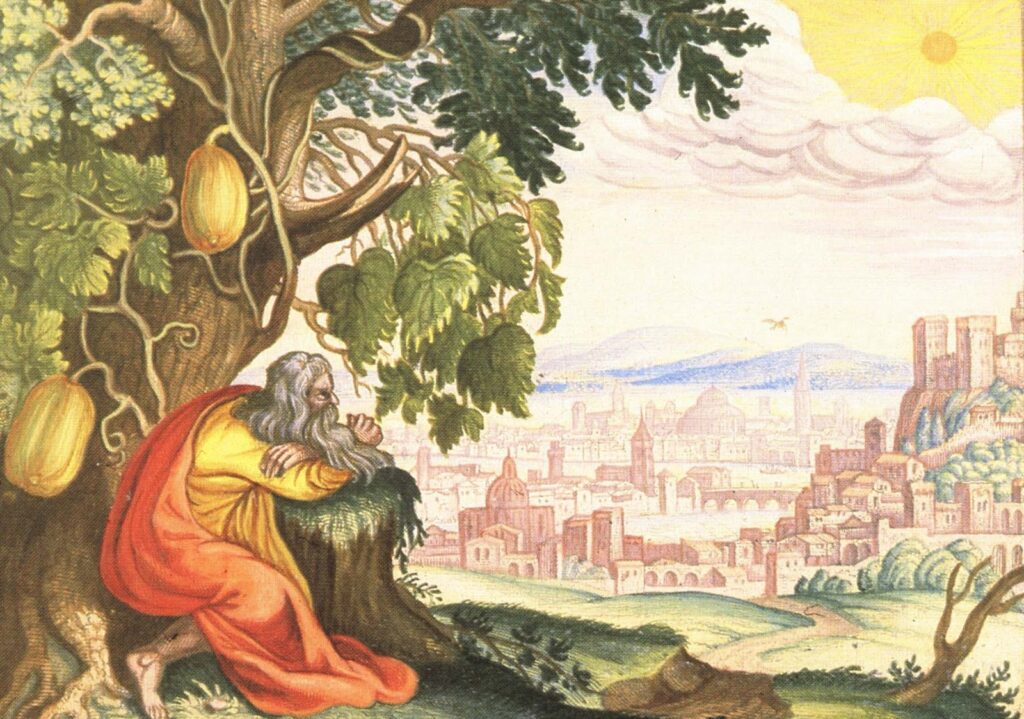
What happens next is a lesson for catechists as well as for Jonah The divine Teacher prepares a concrete learning experience for his thickheaded and hardhearted prophet. In one day a shady gourd plan springs up to protect Jonah from the hot sun. The next day a hungry worm chops on the plant and kills it. For the second time Jonah insists he is so angry he could die. With that, God draws the moral from the withered plant. Jonah is concerned about one gourd plant. Softening his lesson with gentle humor, God asks, “And should I not be concerned over Nineveh, the great city, in which there are more than a hundred and twenty thousand persons who cannot distinguish their right hand form their left, not to mention the many cattle?”
Jonah apparently is speechless for the story abruptly ends with that question. No doubt, knowing the value of personal life stories in his work, Jonah repeated the story of Nineveh over and over during the remaining years of his ministry. Now almost three thousand years later, Jonah’s tale, as a book of the Bible, is still influencing people.
Although he is called a minor prophet and sometimes even the comic relief of the Bible, Jonah is undeniably a man of no small stature. Later another prophet (who could also sleep through storms at sea) compared Jonah’s three-day imprisonment in the whale to his own confinement in a tomb. Ever since than Jonah has been a sign and witness of the Resurrection. What more could you ask for in a patron of catechists?
(Originally published in The Catechist magazine)
• When has something God called you to do resulted in a wonderful thing?
Leave a Comment
Comment
Name (required)
Email (will not be published) (required)
Website
Save my name, email, and website in this browser for the next time I comment.


